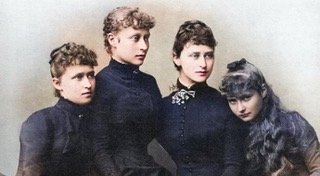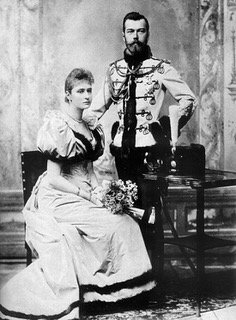The Romanov Brides
A Novel of the Last Tsarina and Her Sisters
New! available now
THE TRAGIC FATE OF NICHOLAS AND ALEXANDRA IS SEARED INTO THE MEMORY OF THE WORLD. HERE’S HOW THEIR STORY BEGAN.
Four royal sisters grow up in Darmstadt, a small city in the Germany. Their mother has died, but their grandmother, Queen Victoria, takes a great interest in getting them married wisely and well. While the Queen wants them to join the English or German royal families, two of the sisters fall in love with Russia, and Romanovs.
Ella weds the tsar’s brother Grand Duke Serge—cultivated, aloof and proud. He places his young wife on a pedestal for all to admire, but behind palace gates, Ella struggles to secure private happiness.
Alix, whisked away to Russia for Ella’s wedding, meets and captivates Nicky, heir to the throne. Not only Queen Victoria but the father Alix adores opposes this marriage. The young princess must listen to the voice of her heart—and soul—to make a decision that will set her on course for a tumultuous life in imperial Russia—a dazzling, decadent world on the brink of disappearing forever.
order Now
Behind the Book
More about the characters, the setting, and the “truth” of The Romanov Brides
MEET VICTORIA, ELLA, IRèNE, AND ALIX OF HESSE.
Said to be the most beautiful princesses in Europe, the four sisters of Hesse grew up in the small German city Darmstadt. After their mother died in 1878 when the youngest, Alix, was just six, their grandmother Queen Victoria took a special interest in them, and was eager to guide them into matches of her choosing. In the end, each sister defied her. The eldest, Victoria, (second from left above) married her cousin Louis, Prince of Battenberg, a clever man without a fortune. He rose in the ranks of the British navy to become First Sea Lord. Prince Philip, Duke of Edinburgh was Victoria’s grandson; King Charles is her great-grandson. But while Queen Victoria fretted about the financial prospects of Louis and Victoria, she despaired when her pet, Princess Ella (second from right), married a Romanov Grand Duke, Serge. The Queen disapproved of the autocratic ruling family of Russia, and the cold and haughty Serge in particular did not appeal to her. Then, to compound her distress, at Ella's wedding, 12-year-old Alix (far right), met the 16-year-old tsarevich, Nicky. One of the most famous—and most tragic—love stories in modern history was set into motion. With the constant encouragement of Ella, Alix overcame a series of obstacles to end up married to Nicky, and in 1894 the imperial couple, Nicholas and Alexandra, became tsar and tsarina of Russia.
why tell this story?
My novel is a kind of prequel. Like all couples Nicholas and Alexandra, the last tsar and tsarina, had a back story—and this is theirs. I was struck as I researched and wrote about their courtship how they were flawed, as all people are, but essentially well-intentioned. Their world was a narrow one for all its sophistication, and they didn't anticipate the historical forces mustering against them. Or perhaps it's more accurate to say they failed to envision how different the future would be from the past. And, most poignantly, they hadn't understood the risk of hemophilia that Alix carried. Their love blossomed in ignorance of much, but within the intimate realm of a glamorous royal circle, at the center of a grand, imperial Europe that was about to disappear forever. I thought readers would love meeting them, and relish entering their world.
How true is The Romanov Brides?
I’m trained as an historian and a journalist. I followed the same principles with this book as with my first novel, A Most English Princess. When your main characters people who actually lived, I believe it’s important to stick as closely as possible to what is known about them—their appearance, their personalities, their movements, their travels. I use facts as the scaffolding for my story-telling. I never have characters in a location where they were not, or using language that they would not speak. To insure this, I rely on biographies and contemporary accounts, including memoirs. But most importantly, I read the letters my protagonists wrote in order to capture their thinking and the way they expressed themselves. I was lucky when it came to The Romanov Brides that thousands of letters written by and to the protagonists have survived, some quite intimate. This is a gold mine for the historical novelist.
Curious to learn more?
These are the letter collections, memoirs, biographies, and historical accounts I relied on to write The Romanov Brides.
A Lifelong Passion: Nicholas and Alexandra, Their Own Story, compiled by Andrei Maylunas and Sergei Mironenko
Queen Victoria’s Matchmaking by Deborah Cadbury
Bread of Exile: A Russian Family by Dimitri Oblonsky
The Life and Death of Ella, Grand Duchess of Russia by Christopher Warwick
Advice to a Granddaughter: Letters from Queen Victoria to the Princess of Hesse compiled by Richard Hough
The Correspondence of the Empress Alexandra of Russia with Ernst Ludwig and Eleonore, Grand Duke and Duchess of Hesse, compiled by Petra Kleinpenning
Dancing in Petersburg: The Memoirs of Mathilde Kschessinska
The Four Graces: Queen Victoria’s Hessian Granddaughters by Ilana Miller
Prince Eddy by Andrew Cook
The Heir Apparent: A Life of Edward VII, the Playboy Prince by Jane Ridley
Louis and Victoria: The Family History of the Mountbattens by Richard Hough
From Battenberg to Mountbatten by E.H. Corkage
Queen Victoria’s Youngest Son: The Untold Story of Prince Leopold by Charlotte Zeepvat
The Romanov Sisters: The Lost Lives of the Daughters of Nicholas and Alexandra by Helen Rappaport
Little Mother of Russia: A Biography of Empress Marie Feodorovna by Coryne Hall
The Romanovs by Simon Sebag Montefiore
George, Nicholas and Wilhelm: Three Royal Cousins and the Road to World War I by Miranda Carter
A Most English Princess
A Novel of Queen Victoria’s Daughter
This debut novel, perfect for fans of PBS’s Victoria and Netflix’s The Crown, will take you behind the walls of Potsdam’s majestic Neues Palais, to experience Vicky’s turbulent life story through her eyes.
Born Victoria, the Princess Royal, Vicky was the eldest child of Queen Victoria and her consort, Prince Albert—and learned from them the proper exercise of royal privilege.
Aged only 15 when she becomes engaged to Fritz, Prince Frederick, heir to the powerful kingdom Prussia, she dreads leaving home forever—but she takes her chance to follow her love and spread enlightened, English ideas abroad.
Brought up believe in the rightness of her cause, Vicky nonetheless struggles to thrive in the constrained Prussian court, where each day she seems to take a wrong step. Her status as Queen Victoria’s daughter does little to smooth over the conflicts she faces.
Still she has handsome, gallant Fritz always by her side. Together they navigate political intrigue, and challenge cunning Otto von Bismarck, to fight for the throne—and the soul of a nation. At home they endure tragedy, including their son, Wilhelm, rejecting all they stand for.
This propulsive story comes to a surprising conclusion—following Vicky from her childhood years as the apple of her father’s eyes through her rise to power atop the mighty German empire to her final months of life when she takes a final, daring step to insure her struggles will not have been in vain.
About Clare McHugh
Clare McHugh is the author of two historical novels, A Most English Princess and The Romanov Brides. After graduating from Harvard College with a degree in European history, she worked for many years as a newspaper reporter and later magazine editor. The mother of two grown children, she currently lives with her husband in London and in Amagansett, New York.
Contact Clare McHugh
Representation:
Laura Dail
Laura Dail Literary Agency
121 West 27th Street, Suite 1201
New York, NY 10001
212.239.7477
ldail@ldlainc.com
For UK press inquiries:
Beth McHattie
Associate Director
Denhams Digital
+44 (0)7388381611
Beth@denhams.digital









